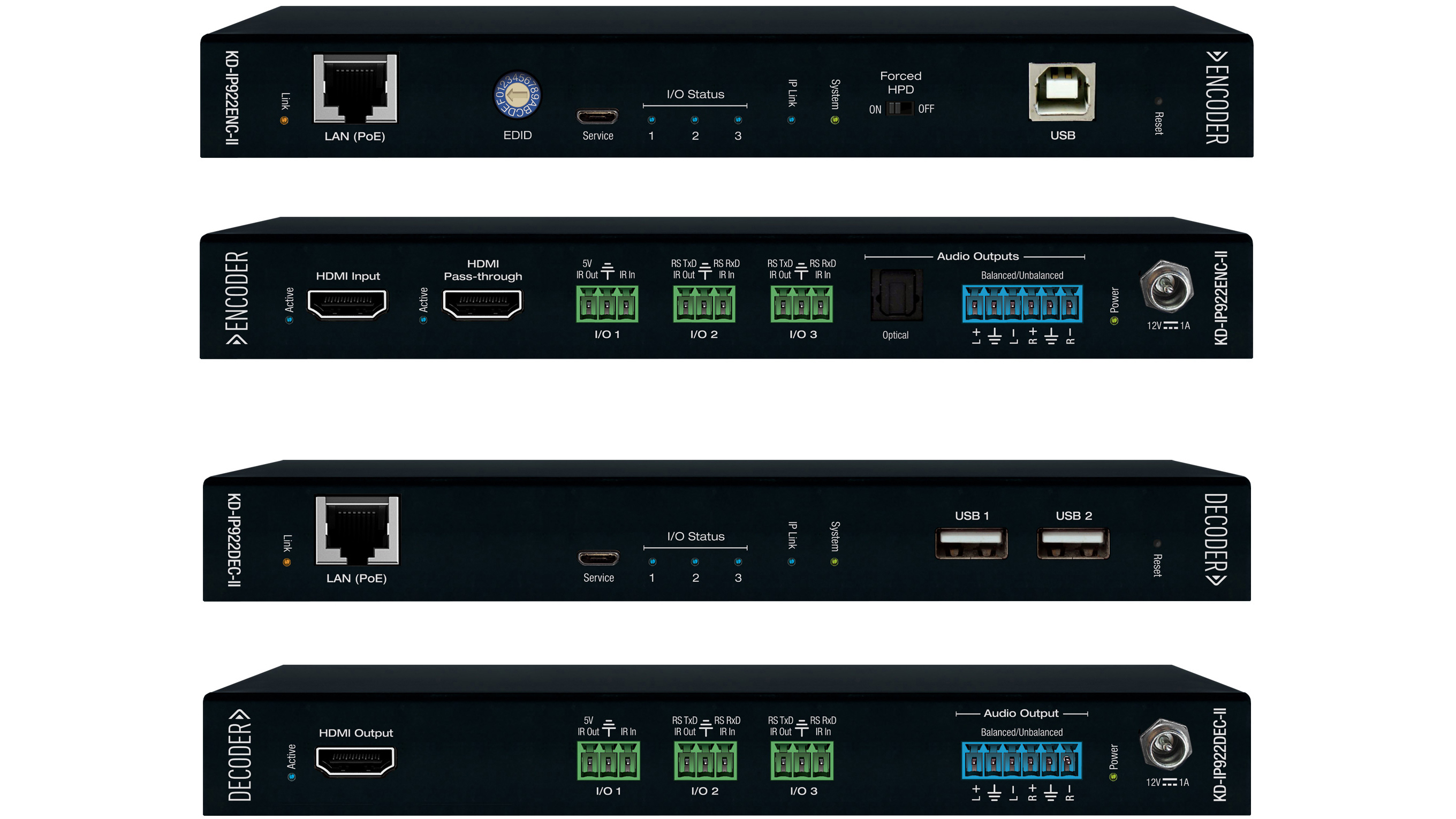Key Digital has introduced its second-generation modular AV over IP systems, the KD-IP922-II and KD-IP1022-II encoders and decoders, with full-featured 4K performance.
“The new KD-IP922-II and KD-IP1022-II components deliver the same performance, reliability and flexibility that our customers rely upon with a subtly refined feature set that satisfies customer requests and application,” said DeWayne Rains, vice president of sales for Key Digital. “What’s more, the cost has been dramatically reduced based on manufacturing efficiencies and new chip sets. Our AV over IP systems ship preconfigured, ready to plug and play, and our setup service is included in the price.”
Key Digital AV-over-IP systems are scalable for use in large enterprise installations to mid-to-large-sized residential projects. Integrated with managed gigabit network switches, the systems enable video/audio distribution, matrix switching, video wall management and signal/control/KVM extension.
Key Digital AV-over IP systems can be sized to suit any application. An HDMI to IP encoder per source feeds the managed switches, and an IP decoder per destination display converts the desired source signal back to HDMI to feed monitors and projectors. USB 2.0 routing follows AV source/display selection with maximum of four USB keyboard or mouse devices simultaneously routed to a single host computer/encoder. A KD-IP1022-II AV-over-IP system extends the capabilities of a KD-922-II system by providing asymmetrical KVM routing and deploying firmware that offers mosaic video wall management. “Additionally,” said Rains, “Key Digital AV over IP encoders and decoders use Power over Ethernet (PoE) when integrated with compatible PoE network switches to eliminate the need for external power supplies for a clean installation, further enhanced by the optional KD-SMS16 mounting system to neatly install up to twelve ENC/DEC units in a rack.”
[Should You Avoid Proprietary Solutions for AVoIP?]
Control is delivered with content in Key Digital AV-over-IP systems. The three multi-function ports on each decoder and encoder—configurable for bidirectional IR and RS-232 or voltage trigger—may be used as Compass Control Pro master controllers for control of and by Compass Alliance partner hardware, by IP control systems via KeyCode open API, or as a control interface for third-party devices. Additionally, system and external device control is available from free software—the iOS Key Digital App and KDMS Pro® for Windows PCs. “The KD iOS App is often all our end users need to elegantly and simply control a full AV over IP system,” said Rains, “while KDMS Pro offers similar control as well as advanced setup capabilities.” The KD App scans its connected local area network to detect systems for control, then auto-populates pre-built GUIs for source and display control of popular devices like Apple TV and cable/satellite tuners via IR, finger-drag video wall management and image preview. The KDMS Pro UI offers mouse drag encoder/decoder device and system setup and similar control functionality as the KD App.
De-embedded two-channel analog outputs (one each encoder and decoder) provide volume, muting, 3-band EQ, and lip-sync delay control. The key addition to the KD-IP922-II and KD-IP1022-II encoder feature sets is digital audio de-embedding via a provided TOSLink optical output with support for Dolby TrueHD, Dolby Digital Plus, Dolby Atmos, and DTS-HD Master Audio multichannel audio protocols. In addition, the encoders retain an HDMI pass through, which can be used as a local audio source as well as providing a local video source. Multichannel audio at the decoders can typically be de-embedded and delivered by the destination monitor. Additional cost savings in the -II models result from the removal of a second network port on both encoders and decoders and the local HDMI input on the decoders, all rarely used.
Key Digital AV-over-IP system specifications include 4K resolution support up to 4096x2160/30Hz/12-bit at 4:4:4; lossless transmission to 10.2Gbps bandwidth and visually lossless compression to 18Gbps; selectable 4K to 1080p/720P down conversion; EDID display identification handshaking (with an internal library featuring 15 default EDID configurations); HDR10 and fully licensed HDCP 2.2 support and compliancy; full support of the latest HDMI capabilities; and a Full Buffer System, which manages TMDS re-clocking / signal re-generation, HDCP authentication with source & display, EDID control handshaking, and hot plug control that enables an integrator to choose if active signal voltage is forced to connected input devices. The encoders provide HDMI extension up to 330 ft / 100 m @ 4K 24/25/30(4:4:4) into the network switch or point-to-point.
[Pioneering the Future of AVoIP]
Using the UHDoTP (Ultra High Definition over Twisted Pair) 4K-to-1080p/720p down-convert feature allows integrators to mix display models and capability within a system, accommodating integration of new and legacy displays by giving the option to choose where this feature should be enabled per output. “A great example of when down-converting might be necessary is when our integrators discuss projectors,” said Rains. “Without down-convert technology, a costly 4K projector would be necessary, which adds a significant price increase that the end user may not be ready for. With UHDoTP technology you can have a mix in which perhaps a front lobby needs to be 4K, but the remainder of the system is great to go on 1080p displays or projectors. Our integrators asked for this technology, and we’re happy to see what a huge value it adds to systems by reaching a higher quality and a lower price point.”
